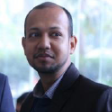
Md. Al-Amin
Work place: American International University-Bangladesh (AIUB), Dhaka, Bangladesh
E-mail: alamin@aiub.edu
Website: https://orcid.org/0000-0001-8744-6432
Research Interests: Computer Science & Information Technology, Information Security, Distributed Computing, Information Systems, World Wide Web, Information-Theoretic Security, Mathematics of Computing
Biography
Md. Al-Amin currently working as a lecturer in the Computer Science Department, at American International University-Bangladesh (AIUB). He founded Deepchain Labs which is a blockchain-focused RD startup in Bangladesh.
He received his Bachelor’s in Software Engineering and Master’s degree in Computer Science and Engineering (CSE) from American International University-Bangladesh(AIUB), Dhaka, Bangladesh in 2015 and 2017 respectively. During his Master’s degree, he was awarded the academic distinction Magna Cum Laude(Silver Medal) award for his academic results. He achieved two times ICT Fellowship Awards for the years 2016 2017 from the Ministry of ICT, Government of Bangladesh.
He has also served as a registration committee member at the International Conference on Computing Advancements (ICCA 2020). He published several conference journal papers mainly focused on Web3 Blockchain. He is also a member of Bangladesh’s computer society. He was a distinguished juror in the National Blockchain Olympiad Bangladesh 2022 mentor in the International Blockchain Olympiad 2022.
His research interest primarily focuses on Distributed Ledger Technology (DLT), Blockchain Technology, Web 3.0, Distributed Computing, Web of Things, Information Se curity, Web Assembly, and Knowledge base System.
Author Articles
Towards a Novel Identity Check Using Latest W3C standards & Hybrid Blockchain for Paperless Verification
By Samiur Rahman Khan Md. Al-Amin
DOI: https://doi.org/10.5815/ijieeb.2023.04.02, Pub. Date: 8 Aug. 2023
With the advent of W3C standards such as DID, VCs, and DPKI beyond 2020, the industry has reached a new level where a technological infrastructure overhaul is possible. By employing blockchain and other Decentralized Ledger Technologies, it is believed that we can eliminate the requirement for paper-based verification. Researchers are aware of the technological components we possess at present and are trying to bring forth their sets of POCs. Additionally, governments ranging from developing to developed countries are taking industrial initiatives that incorporate these technologies. This research also evaluates the latest events and cases to find the need for paperless verification. Previous development conducted in the domains of Information Systems and Public forensics has presented us with various issues at both infrastructural and user levels. It also introduced us to the presence of lots of gaps present that can be improved with a more improvised form of decentralized paperless solution. Researchers have pointed out that the modern day identity check and forensic solutions will face difficulties with blockchain compatibility, since most of those previous components will require built-in integration with a decentralized environment. As the latest researches suggest the key to this integration is now possible with the proper application of the W3C standards. In this paper, we propose an architecture that interlinks the latest decentralized W3C standards with a permissioned blockchain for implementing paperless verification and identity check.
[...] Read more.The Decentralized Shariah-Based Banking System in Bangladesh Using Block-chain Technology
By Oishi Chowdhury Md Al Samiul Amin Rishat Md. Al-Amin Md. Hanif Bin Azam
DOI: https://doi.org/10.5815/ijieeb.2023.03.02, Pub. Date: 8 Jun. 2023
Shariah-based banking aims to apply Islamic finance while adhering to Shariah principles. The primary distinction between conventional and Islamic finance is that Sharia law explicitly forbids several of the activities and principles applied in conventional banking. According to Sharia law, “Paying or charging an interest (Riba)” lending with interest payments as an exploitative practice that benefits the lender at the expense of the borrower, “investing in businesses engaged in banned activities" like producing and selling alcohol or pork, “speculation or gambling(Maisir)” That means financial institutions are prohibited from participating in contracts where the ownership of goods depends on an unpredictable future event, and Participation in contracts with a high level of risk or uncertainty is referred to as "uncertainty and risk (Gharar)", which are strictly prohibited. As a result, consumers must be aware of whether they are taking Riba, Gharar, Maisir or if their money is invested in a halal firm. Because of its qualities, blockchain would be useful in this situation. This research tries to determine how blockchain technology can be used to make investments and profit or loss returns more transparent, more secure, Immutable and sharia compliant. Blockchain networks can be utilized in the financial industry, such as banking, to provide safe sharia banking.
[...] Read more.Other Articles
Subscribe to receive issue release notifications and newsletters from MECS Press journals